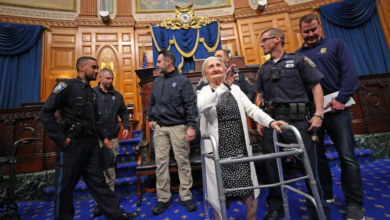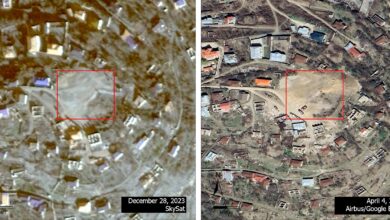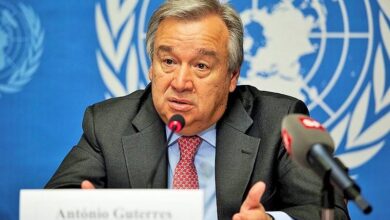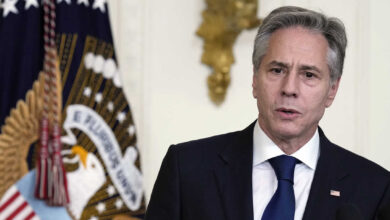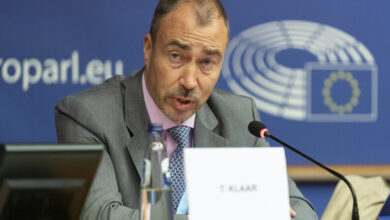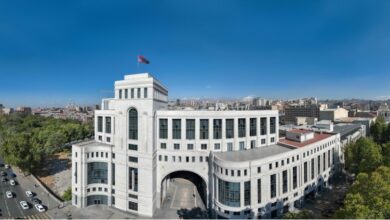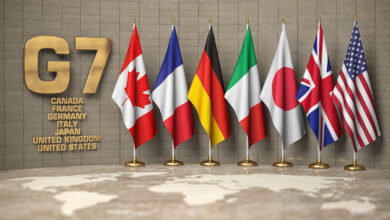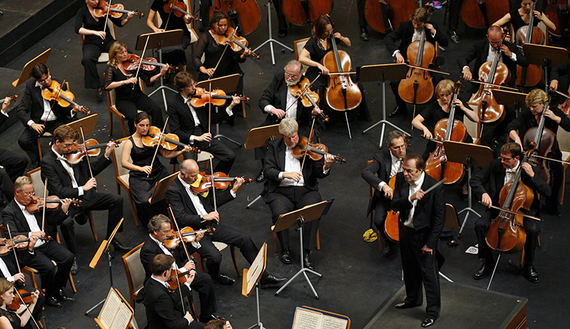
Vartan Melkonian is one of the conductors of Britain’s Royal Philharmonic Orchestra. A century ago, his ancestors lived in Mus, eastern Turkey, until the day Ottoman rulers made a decision to “deport” Armenians.
Melkonian and his daughter Veronica will be in Turkey in February for their “Walking for Armenia” project — a 1,000-kilometer (621-mile) march they plan to start in Van, eastern Turkey, and complete at the Birds’ Nest Orphanage in the Lebanese capital, Beirut. The Syrian stretch of the route poses a serious risk for the Melkonians, but they are determined to walk it despite the threat of war and the Islamic State (IS), Al-Monitor reports.
In an interview with Radikal Vartan Melkonian speaks about the march he and his daughter will make from Turkey to Lebanon to commemorate ancestors who perished in the Armenian genocide.
Radikal: How did you come up with the “Walking for Armenia” project? Was it your or your daughter’s idea?
Melkonian: It was my daughter’s idea. She suggested we walk the same distance in the footsteps of our ancestors to commemorate the 100th anniversary of the Armenian genocide. Just as our ancestors did.
Radikal: Don’t you have security concerns? Don’t you feel any anxiety over the assassination of Agos editor-in-chief Hrant Dink in Istanbul in 2007 and the 2008 murder of [Italian activist] Pippa Bacca who had come to Turkey with her “Peace Bride” project?
Melkonian: I’m aware of the murders of both Hrant Dink and Pippa Bacca. Those are very sad incidents. But when my daughter first proposed this idea a year ago, she had no security concern. Being a university student, she is aware she is leaving a safe life behind in Britain for this project.
Radikal: But the danger today is not limited to Turkey. The war in Syria is going on and there is the threat of IS.
Melkonian: The circumstances were different when she first came up with the project. Naturally, the reports of people being kidnapped, beheaded and raped are not part of her daily life. Today the region has become polarized.
Radikal: Are you going to stick to this route in February?
Melkonian: That’s our plan.
Radikal: According to your road map, you will enter Syria from Kobani. Are you going to change your plan in line with the latest situation?
Melkonian: When we started the project IS was not there. We are not planning to change our route at this stage.
Radikal: What reactions do you think a project evoking the genocide on its 100th anniversary will generate in Turkey?
Melkonian: I think that all peoples, everybody, should be prepared for such projects. This project will be a modest and graceful way to remember our loved ones. My daughter and I will be only remembering our ancestors.
Radikal: What are the initial reactions? Have people contacted you through your website?
Melkonian: All in all this is an individual effort. Our sole purpose is to commemorate family members who died 100 years ago without leaving a trace. We have been flooded with messages of support from all over the world. And we are grateful to all of them.
Radikal: The Catholicos of Cilicia, Aram I, also lent support to your project.
Melkonian: Yes, he did. But he is worried about the security conditions of our march. Still, he conveyed a message to the world in the letter he wrote us. We have posted it on our website, www.walkingforarmenia.com. He says in his message that our project is an important initiative that will remind the world that the genocide perpetrated against the Armenians by the Ottoman-Turkish government must never ever happen again.
Radikal: Are you going to make any statements or convey any messages during the march?
Melkonian: I won’t have any political, religious or philosophical messages to convey. I will be only walking with questions still burning inside me. What happened to my ancestors 100 years ago? Why did my parents lose their family at a very early age and live in an orphanage away from their homeland, away from home?
Radikal: Why did you choose Van as the starting point for the march? Why not Erzurum, Harput or Diyarbakir, which is closer to the border? Where were you ancestors from?
Melkonian: We chose Van for practical reasons. My family members were not born in Van. They were born in Mus, the hometown of Vartan Mamigonian, an important historical figure for Armenians. Anyway, our purpose is to trace the route of 100 years ago.
Radikal: What stories are left for you from 1915?
Melkonian: I know nothing about my grandmothers and grandfathers, neither their names nor their ages in 1915, nothing. … I’ve listened to very few memories from my father about his parents. He remembered large gardens and houses. He was only 6 at the time, though he was the family’s eldest child. His only memory of his parents was the last time he saw them, surrounded by soldiers.
Radikal: Your route ends at the Birds’ Nest orphanage in Beirut where you grew up.
Melkonian: My parents got married in a refugee camp in Beirut. My mother died when I was 4. That’s why I was sent to the Birds’ Nest orphanage [run by] Danish missionaries. One of the people in the orphanage, Maria Jacobsen, had witnessed the aftermath of the massacres in 1915. That’s the reason why we’ll end the march at the orphanage, my home, the only home I’ve known.
Radikal: What does Turkey and Eastern Anatolia mean to you today?
Melkonian: For me, Eastern Anatolia is a mournful land. I am moved at any mention of it. After all, Mus, a part of Greater Armenia, was the homeland of my ancestors.
Radikal: Lastly, what is your message to Turkey and its people?
Melkonian: Just as the good things your family could have done in the past doesn’t make you a good person, the bad things they could have done doesn’t make you a bad one. But the denial of historic facts is something to have a negative impact on you and torment your soul.


